| | Mathison Museum of Natural History |  |
|
+15Caracal widukind lucky luke Megaptera rogerpgvg Jill sunny pipsxlch Saarlooswolfhound landrover Kikimalou Taos Duck-Anch-Amun Shanti Saien 19 posters |
|
| Author | Message |
|---|
widukind
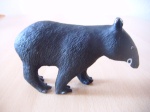
Country/State : Germany
Age : 48
Joined : 2010-12-30
Posts : 45745
 |  Subject: Re: Mathison Museum of Natural History Subject: Re: Mathison Museum of Natural History  Sat Mar 04, 2023 7:52 am Sat Mar 04, 2023 7:52 am | |
| |
|
  | |
bmathison1972
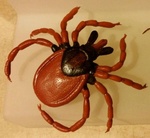
Country/State : Salt Lake City, UT
Age : 52
Joined : 2010-04-12
Posts : 6710
 |  Subject: Re: Mathison Museum of Natural History Subject: Re: Mathison Museum of Natural History  Sun Mar 05, 2023 7:40 am Sun Mar 05, 2023 7:40 am | |
| Species: Malurus cyaneus (Ellis, 1792) Common name(s): superb fairywren About the Figure: Manufacturer: Science and Nature Series: Animals of Australia - Small Year of Production: 2009 Size/Scale: Figure 5.7 cm across it's widest points. Scale difficult to calculate, but using tail length as a metric (n=2.7 cm), scale comes to approximately 1:2 Frequency of species in toy/figure form (at time of posting): Unique Miscellaneous Notes: This figure is stamped 'blue wren' which is a common name of a few Australasian wrens in the genus Malurus; however, the color best favors the identification of M. cyaneus. The color isn't perfect for this species (the dorsal portion of the tail should also be dark blue, not black, and the actual species appears to lack the blue band on the wings as shown in this figure), but otherwise there isn't a closer option. Cadbury produced the related splendid fairywren ( M. splendens) for both the Australian and UK releases of the original Yowies. About the Animal: Geographic distribution: Southeastern Australia (incl. Tasmania) Habitat: Open woodlands, especially in areas with dense undergrowth; also urban and suburban areas, parks, gardens Diet: Primarily insects and other invertebrates; occasionally seeds, flowers, small fruits IUCN Status (at time of posting): Least Concern Miscellaneous Notes: Like many birds, M. cyaneus exhibits extreme sexual dimorphism in relation to color. Breeding males (as shown here today) have a bright blue cap, cheeks, and nape, with a deeper blue throat and tail, and a dark beak. Females are dorsally dull brown with a white throat and breast, brown tail, and brown-orange beak. Juvenile and non-breeding males are similar to the female, but will usually have some traces of blue around the head, a blue tail, and a dark beak. [You must be registered and logged in to see this image.]
Last edited by bmathison1972 on Sun Mar 05, 2023 3:04 pm; edited 1 time in total |
|
  | |
widukind

Country/State : Germany
Age : 48
Joined : 2010-12-30
Posts : 45745
 |  Subject: Re: Mathison Museum of Natural History Subject: Re: Mathison Museum of Natural History  Sun Mar 05, 2023 8:37 am Sun Mar 05, 2023 8:37 am | |
| |
|
  | |
rogerpgvg
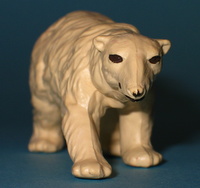
Country/State : UK
Age : 54
Joined : 2016-04-29
Posts : 3894
 |  Subject: Re: Mathison Museum of Natural History Subject: Re: Mathison Museum of Natural History  Sun Mar 05, 2023 12:32 pm Sun Mar 05, 2023 12:32 pm | |
| And a great name for a bird! |
|
  | |
Caracal
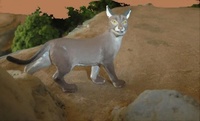
Country/State : France
Age : 65
Joined : 2018-10-24
Posts : 7252
 | |
  | |
bmathison1972

Country/State : Salt Lake City, UT
Age : 52
Joined : 2010-04-12
Posts : 6710
 |  Subject: Re: Mathison Museum of Natural History Subject: Re: Mathison Museum of Natural History  Mon Mar 06, 2023 7:30 am Mon Mar 06, 2023 7:30 am | |
| Species: Vanessa cardui (Linnaeus, 1758) Common name(s): painted lady; cosmopolitan; thistle butterfly About the Figure: Manufacturer: Bullyland Series: Butterflies on Strings Year of Production: 1998 Size/Scale: Wingspan 7.0 cm, within scale 1:1 for a large specimen Frequency of species in toy/figure form (at time of posting): Very rare Miscellaneous Notes: The 'Butterflies on Strings' collections were two sets of butterflies released by Bullyland. The figures had a loop of chord attached to the top of the thorax via a screw (hence the unsightly hole), so they can hang from things. There are eight figures in this set, with four sculpts shared among them; at times the wing shape isn't very accurate for the intended species (as shown here today). The set was also sold as 'swingers', figures suspended on a wire attached to a base. The only other figures of this species I am aware of are those in a life cycle set by Insect Lore (with a much more realistic adult, I may say). About the Animal: Geographic distribution: Widely distributed throughout much of the world, including most of North America, south to Panama (less common south of Mexico); Africa outside of dense rainforest and much of the Sahara; most of Europe and Asia (less common in Southeast Asia); coastal Western Australia. Absent from South America and Antarctica. Vanessa cardui is sometimes irruptive, meaning it can be absent in an area for long periods of time and then suddenly abundant for one or more years. Habitat: Primarily areas of open vegetation, such as meadows and fields, but also open woodlands, taiga, rainforest, scrub forest, deserts, swamps and marshes, agricultural fields, urban and suburban parks and gardens; highly adaptable for any habitat with appropriate host plants Diet: Larvae feed on a wide variety of plants; favorite wild host plants include Carduus (musk thistles), Cirsium (common thistles), Urtica (nettles), Alcea (hollyhocks), and Arctium (burdocks). Adults take nectar from a wide variety of flowers. IUCN Status (at time of posting): Least Concern Miscellaneous Notes: Throughout its range, V. cardui engages in seasonal, sometimes multigenerational, migrations. In North America, overwintering adults in Mexico migrate north to the northern United States and Mexico. In the Palearctic, migration patterns are well-documented. Populations in Mediterranean Europe and North Africa migrate throughout Europe in the Spring, sometimes reaching Iceland. Populations in the Red Sea Basin migrate to Turkey via Cypress and Israel. [You must be registered and logged in to see this image.] |
|
  | |
widukind

Country/State : Germany
Age : 48
Joined : 2010-12-30
Posts : 45745
 |  Subject: Re: Mathison Museum of Natural History Subject: Re: Mathison Museum of Natural History  Mon Mar 06, 2023 11:25 am Mon Mar 06, 2023 11:25 am | |
| |
|
  | |
bmathison1972

Country/State : Salt Lake City, UT
Age : 52
Joined : 2010-04-12
Posts : 6710
 |  Subject: Re: Mathison Museum of Natural History Subject: Re: Mathison Museum of Natural History  Tue Mar 07, 2023 6:44 am Tue Mar 07, 2023 6:44 am | |
| Species: Umbonia crassicornis (Amyot & Audinet-Serville, 1834) Common name(s): thorn bug; thorn-mimic treehopper About the Figure: Manufacturer: New-Ray Series: New-Ray Invertebrates Year of Production: 1995 Size/Scale: Body length 4.5 cm for a scale of 5:1-3.5:1 Frequency of species in toy/figure form (at time of posting): Very rare Miscellaneous Notes: This figure is not identified at the species level and the identification is my own; I am sure the Play Visions thorn bug is also intended to be this species. The New-Ray toy comes in two color forms, the one shown here today and a predominately green figure with pale wings. About the Animal: Geographic distribution: Extreme southern USA (Florida, southern Texas) to South America Habitat: Tropical and subtropical lowland forests, orchards, parks, yards Diet: Nymphs and adults feed on the sap of shrubs and trees of many genera in several families; occasionally a pest of ornamentals and fruit trees IUCN Status (at time of posting): Not Evaluated Miscellaneous Notes: The elongated prothoracic spine is believed to be a form of mimicry, to confuse birds and other would-be predators into thinking the bug is a thorn or other natural extension of the plant. Females of U. crassicornis are always thorn-like, but males can exhibit extreme variability in the form of this 'spine'. In some, it's stout and pointed like a thorn, while in others it is longer and more slender as if resembling a small twig. [You must be registered and logged in to see this image.] |
|
  | |
widukind

Country/State : Germany
Age : 48
Joined : 2010-12-30
Posts : 45745
 |  Subject: Re: Mathison Museum of Natural History Subject: Re: Mathison Museum of Natural History  Tue Mar 07, 2023 12:07 pm Tue Mar 07, 2023 12:07 pm | |
| |
|
  | |
rogerpgvg

Country/State : UK
Age : 54
Joined : 2016-04-29
Posts : 3894
 |  Subject: Re: Mathison Museum of Natural History Subject: Re: Mathison Museum of Natural History  Tue Mar 07, 2023 12:47 pm Tue Mar 07, 2023 12:47 pm | |
| Interesting species, not one I had ever heard of. |
|
  | |
Caracal

Country/State : France
Age : 65
Joined : 2018-10-24
Posts : 7252
 | |
  | |
pipsxlch

Country/State : US/Florida
Age : 56
Joined : 2015-03-12
Posts : 2849
 |  Subject: Re: Mathison Museum of Natural History Subject: Re: Mathison Museum of Natural History  Tue Mar 07, 2023 11:06 pm Tue Mar 07, 2023 11:06 pm | |
| I've caught them, always thought they were kind of neat bugs. The ones I played with were greener than this model; maybe like the other paint job? But they did look like this. |
|
  | |
bmathison1972

Country/State : Salt Lake City, UT
Age : 52
Joined : 2010-04-12
Posts : 6710
 |  Subject: Re: Mathison Museum of Natural History Subject: Re: Mathison Museum of Natural History  Wed Mar 08, 2023 7:37 am Wed Mar 08, 2023 7:37 am | |
| - pipsxlch wrote:
- I've caught them, always thought they were kind of neat bugs. The ones I played with were greener than this model; maybe like the other paint job? But they did look like this.
you live in a state with a great fauna :) Next up: Species: Acheilognathus cyanostigma Jordan & Fowler, 1903 Common name(s): striped bitterling About the Figure: Manufacturer: Kaiyodo Series: Capsule Q Museum - Biwako Year of Production: 2014 Size/Scale: Body length 5.7 cm, within scale 1:1 (slightly under 1:1 for a maximum-sized specimen) Frequency of species in toy/figure form (at time of posting): Unique (as a pair) Miscellaneous Notes: These two figures have the same sculpt, with one representing a male (left) and one a female (right). Other than a slight difference in color, the female comes with an ovipositor depositing eggs in a freshwater mussel which serves as its base (see below). Some assembly is required and the fish is removable from its mollusk base. About the Animal: Geographic distribution: Japan; originally endemic to Lakes Biwa and Yogo; naturalized in the Nobi Plains floodplain, Lake Mikata, and the Yahagi and Midori Rivers Habitat: Freshwater lakes and surrounding rivers, canals, ditches Diet: Freshwater insects and crustaceans, algae IUCN Status (at time of posting): Endangered Miscellaneous Notes: Acheilognathus cyanostigma has a symbiotic relationship with freshwater mussels. Females lay their eggs in the respiratory siphon of the mussel while the male stands guard. Afterwards, the male releases his spermatozoa in the mussel. The developing fish embryos stay within the host mussel's gills until they are capable of swimming. [You must be registered and logged in to see this image.] |
|
  | |
widukind

Country/State : Germany
Age : 48
Joined : 2010-12-30
Posts : 45745
 |  Subject: Re: Mathison Museum of Natural History Subject: Re: Mathison Museum of Natural History  Wed Mar 08, 2023 12:26 pm Wed Mar 08, 2023 12:26 pm | |
| |
|
  | |
bmathison1972

Country/State : Salt Lake City, UT
Age : 52
Joined : 2010-04-12
Posts : 6710
 |  Subject: Re: Mathison Museum of Natural History Subject: Re: Mathison Museum of Natural History  Thu Mar 09, 2023 7:16 am Thu Mar 09, 2023 7:16 am | |
| Species: Ctenocephalides sp. Common name(s): cat and dog fleas About the Figure: Manufacturer: unknown Series: unknown Year of Production: unknown Size/Scale: Body length 8.0 cm for a scale of 26.7:1-20:1 for a member of the genus Frequency of species in toy/figure form (at time of posting): Rare Miscellaneous Notes: I don't know anything about this figure. I bought it from forum member sphyrna18, who bought some at the International Gift Expo of the Smokey Mountains. They were being sold at the expo by Dillion Importing, who specialized in niche novelties from China. But who actually produced it, we do not know. It has no markings indicating a brand or year of production. Nowadays, I wouldn't buy an unbranded figure such as this, but as a professional parasitologist, I cannot turn down a nice rendition of an ectoparasitic insect! The identification is my own, based on the presence of genal and pronotal combs in combination with the familiarity of the genus. About the Animal: Geographic distribution: Worldwide Habitat: Larvae live in the environment, usually in close proximity to the host; adults are obligate ectoparasites on the skin of the host Diet: Larvae feed on organic material, including feces of adult fleas and the host animal; adults take blood from mammal hosts IUCN Status (at time of posting): N/A Miscellaneous Notes: Normally parasites of dogs and cats, Ctenocephalides species have medical importance. They can vector Rickettsia felis when thier feces are rubbed into bites, cuts, and wounds, and they can serve as intermediate hosts for tapeworms such as Dipylidium caninum, Hymenolepis diminuta, and Rodentolepis nana when accidentally ingested (such as when a child kisses their pet dog or cat). [You must be registered and logged in to see this image.] |
|
  | |
widukind

Country/State : Germany
Age : 48
Joined : 2010-12-30
Posts : 45745
 |  Subject: Re: Mathison Museum of Natural History Subject: Re: Mathison Museum of Natural History  Thu Mar 09, 2023 11:36 am Thu Mar 09, 2023 11:36 am | |
| |
|
  | |
rogerpgvg

Country/State : UK
Age : 54
Joined : 2016-04-29
Posts : 3894
 |  Subject: Re: Mathison Museum of Natural History Subject: Re: Mathison Museum of Natural History  Thu Mar 09, 2023 12:08 pm Thu Mar 09, 2023 12:08 pm | |
| I imagine this is a must-have figure. Such a common insect, but so rare as a figure. |
|
  | |
bmathison1972

Country/State : Salt Lake City, UT
Age : 52
Joined : 2010-04-12
Posts : 6710
 |  Subject: Re: Mathison Museum of Natural History Subject: Re: Mathison Museum of Natural History  Fri Mar 10, 2023 7:09 am Fri Mar 10, 2023 7:09 am | |
| Species: Orycteropus afer (Pallas, 1776) Common name(s): aardvark About the Figure: Manufacturer: Safari Ltd. Series: Wild Safari Wildlife Year of Production: 2015 (2005) Size/Scale: Body length (excluding tail) approximately 8.9 cm for a scale of 1:11.8-1:14.7 Frequency of species in toy/figure form (at time of posting): Uncommon Miscellaneous Notes: My figure is the 2015 repaint of a model that originally came out in 2005. Largely ignored in recent years, the aardvark is getting some attention again, with a release already this year by Schleich and an anticipated release later this year by Mojö Fun. There does appear to be a minor inaccuracy on this Safari figure, if I am interpreting things correctly. There appears to be five claws on the front feet, where in the real animal there is only four. About the Animal: Geographic distribution: Sub-Saharan Africa Habitat: Grasslands, savanna, open woodlands, bushland Diet: Ants, termites IUCN Status (at time of posting): Least Concern Miscellaneous Notes: Orycteropus afer is well adapted for a myrmecophagous lifestyle. It's front claws are adapted for digging into ant and termite nests. It has a long, slender snout and a very keen sense of smell. It has a very long sticky tongue (up to 30 cm long) for picking up ants and termites deep within the tunnels of their nests. It swallows its prey whole and the insects are digested in the pyloric region of the aardvark's gizzard-like stomach. [You must be registered and logged in to see this image.] |
|
  | |
Shanti
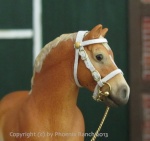
Country/State : Germany
Age : 64
Joined : 2014-02-12
Posts : 1467
 |  Subject: Re: Mathison Museum of Natural History Subject: Re: Mathison Museum of Natural History  Fri Mar 10, 2023 11:59 am Fri Mar 10, 2023 11:59 am | |
| |
|
  | |
Caracal

Country/State : France
Age : 65
Joined : 2018-10-24
Posts : 7252
 | |
  | |
widukind

Country/State : Germany
Age : 48
Joined : 2010-12-30
Posts : 45745
 |  Subject: Re: Mathison Museum of Natural History Subject: Re: Mathison Museum of Natural History  Sat Mar 11, 2023 3:05 am Sat Mar 11, 2023 3:05 am | |
| |
|
  | |
bmathison1972

Country/State : Salt Lake City, UT
Age : 52
Joined : 2010-04-12
Posts : 6710
 |  Subject: Re: Mathison Museum of Natural History Subject: Re: Mathison Museum of Natural History  Sat Mar 11, 2023 5:47 am Sat Mar 11, 2023 5:47 am | |
| Species: Aepyceros melampus (Lichtenstein, 1812) Common name(s): impala; rooibok About the Figure: Manufacturer: Papo Series: Wild Animals Year of Production: 2016 Size/Scale: Height at shoulder approximately 6.5 cm for a scale of 1:11.5-1:14 Frequency of species in toy/figure form (at time of posting): Uncommon Miscellaneous Notes: For such a familiar species, it has been largely ignored in the modern era by Western companies. Bullyland released a decent version recently, in 2021. About the Animal: Geographic distribution: Southern Africa Habitat: Open woodlands, grassland, savanna Diet: Primarily grasses; also herbaceous plants, forbs, fruits, and Acacia seed pods. Generally speaking, A. melampus is a grazer in the wet season and a browser in the dry season. IUCN Status (at time of posting): Least Concern Miscellaneous Notes: Aepyceros melampus has different social structures depending on the season. During the wet season, there are three distinct groupings: 1) territorial males, with or without breeding females, 2) bachelor herds of non-territorial adult and juvenile males, and 3) females and their dependent offspring. During the mating season, territorial males keep smaller, tighter territories that are more aggressively defended. [You must be registered and logged in to see this image.] |
|
  | |
bmathison1972

Country/State : Salt Lake City, UT
Age : 52
Joined : 2010-04-12
Posts : 6710
 |  Subject: Re: Mathison Museum of Natural History Subject: Re: Mathison Museum of Natural History  Sun Mar 12, 2023 6:42 am Sun Mar 12, 2023 6:42 am | |
| Species: Hemitragus jemlahicus (Smith, 1826) Common name(s): Himalayan tahr About the Figure: Manufacturer: CollectA Series: Wildlife Year of Production: 2016 Size/Scale: Height at shoulder approximately 5.7 cm for a scale of 1:11.4-1:17.5 Frequency of species in toy/figure form (at time of posting): Unique to very rare (see below) Miscellaneous Notes: According to Toy Animal Wiki, Marx produced a Himalayan tahr in the 1950s or 1960s in conjunction with McDonalds. The toy looks small and is monochromatic, and I am not sure if that is a community-based identification or was intended by Marx. Either way, today's CollectA model is the only one produced by a major manufacturer in the modern era. About the Animal: Geographic distribution: Himalayan Mountains of southern Tibet, northern India, western Bhutan, and Nepal; introduced to Argentina, New Zealand, South Africa, Canada (Ontario), and USA (New Mexico) for hunting Habitat: Alpine and subalpine wooded hills and mountain slopes; seasonally H. jemlahicus will also use mixed oak forests and alpine meadows Diet: Primarily grasses; seasonally, leaves of woody plants and fruit IUCN Status (at time of posting): Near Threatened Miscellaneous Notes: In some places where H. jemlahicus has been introduced for hunting, it has had a negative impact on native ecosystems. This has been particularly true in New Zealand, which doesn't have native grazers or browsers. The increased herbivory may also cause a decrease in soil nutrients, making it more difficult for plants to grow at all. Hunting is currently the primary method of control of tahr population in New Zealand; however, in the 1960s sodium monofluoroacetate was used to poison tahrs. The use of the chemical was discontinued due to its adverse affects on other mammals, such as cats, dogs, pigs, and deer (all also introduced) an political pressure by hunters. [You must be registered and logged in to see this image.] |
|
  | |
widukind

Country/State : Germany
Age : 48
Joined : 2010-12-30
Posts : 45745
 |  Subject: Re: Mathison Museum of Natural History Subject: Re: Mathison Museum of Natural History  Sun Mar 12, 2023 7:35 am Sun Mar 12, 2023 7:35 am | |
| |
|
  | |
Jill

Country/State : USA
Age : 39
Joined : 2021-04-12
Posts : 2349
 |  Subject: Re: Mathison Museum of Natural History Subject: Re: Mathison Museum of Natural History  Sun Mar 12, 2023 2:17 pm Sun Mar 12, 2023 2:17 pm | |
| |
|
  | |
Sponsored content
 |  Subject: Re: Mathison Museum of Natural History Subject: Re: Mathison Museum of Natural History  | |
| |
|
  | |
| | Mathison Museum of Natural History |  |
|
